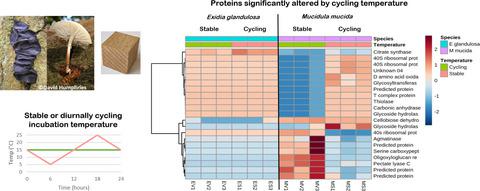Our official English website, www.x-mol.net, welcomes your
feedback! (Note: you will need to create a separate account there.)
Metabolic responses of two pioneer wood decay fungi to diurnally cycling temperature
Journal of Ecology ( IF 5.3 ) Pub Date : 2021-07-12 , DOI: 10.1111/1365-2745.13716 Anna Rawlings 1 , Eoin O'Connor 2 , Suzy C. Moody 1, 3 , Ed Dudley 4 , Lynne Boddy 5 , Mike S. Fowler 1 , David A. Fitzpatrick 2 , Sean Doyle 2 , Dan C. Eastwood 1
中文翻译:

两种先锋木材腐烂真菌对昼夜循环温度的代谢反应
更新日期:2021-07-12
Journal of Ecology ( IF 5.3 ) Pub Date : 2021-07-12 , DOI: 10.1111/1365-2745.13716 Anna Rawlings 1 , Eoin O'Connor 2 , Suzy C. Moody 1, 3 , Ed Dudley 4 , Lynne Boddy 5 , Mike S. Fowler 1 , David A. Fitzpatrick 2 , Sean Doyle 2 , Dan C. Eastwood 1
Affiliation

|
- Decomposition of lignin-rich wood by fungi drives nutrient recycling in woodland ecosystems. Fluctuating abiotic conditions are known to promote the functioning of ecological communities and ecosystems. In the context of wood decay, fluctuating temperature increases decomposition rates. Metabolomics, in tandem with other ‘omics tools, can highlight the metabolic processes affected by experimental treatments, even in the absence of genome sequences and annotations. Globally, natural wood decay communities are dominated by the phylum Basidiomycota. We examined the metabolic responses of Mucidula mucida, a dominant constituent of pioneer communities in beech branches in British woodlands, and Exidia glandulosa, a stress-selected constituent of the same communities, in response to constant and diurnally cycling temperature.
- We applied untargeted metabolomics and proteomics to beech wood blocks, colonised by M. mucida or E. glandulosa and exposed to either diurnally cycling (mean 15 ± 10°C) or constant (15°C) temperature, in a fully factorial design.
- Metabolites and proteins linked to lignin breakdown, the citric acid cycle, pentose phosphate pathway, carbohydrate metabolism, fatty acid metabolism and protein biosynthesis and turnover were under-enriched in fluctuating, compared to stable temperatures, in the generalist M. mucida. Conversely, E. glandulosa showed little differential response to the experimental treatments.
- Synthesis. By demonstrating temperature-dependant metabolic signatures related to nutrient acquisition in a generalist wood decay fungus, we provide new insights into how abiotic conditions can affect community-mediated decomposition and carbon turnover in forests. We show that mechanisms underpinning important biogeochemical processes can be highlighted using untargeted metabolomics and proteomics in the absence of well-annotated genomes.
中文翻译:

两种先锋木材腐烂真菌对昼夜循环温度的代谢反应
- 真菌对富含木质素的木材的分解驱动了林地生态系统中的养分循环。众所周知,波动的非生物条件会促进生态群落和生态系统的功能。在木材腐烂的情况下,波动的温度会增加分解率。代谢组学与其他“组学工具”相结合,可以突出受实验治疗影响的代谢过程,即使在没有基因组序列和注释的情况下也是如此。在全球范围内,天然木材腐烂群落以担子菌门为主。我们检查了 Mucidula mucida 的代谢反应,Mucidula mucida是英国林地山毛榉树枝中先锋群落的主要组成部分,以及腺体Exidia,相同群落的压力选择成分,以响应恒定和昼夜循环温度。
- 我们将非靶向代谢组学和蛋白质组学应用于山毛榉木块,这些木块被M. mucida或E. glandulosa定殖,并在全因子设计中暴露于昼夜循环(平均 15 ± 10°C)或恒定(15°C)温度。
- 在多面手M. mucida中,与稳定的温度相比,与木质素分解、柠檬酸循环、磷酸戊糖途径、碳水化合物代谢、脂肪酸代谢和蛋白质生物合成和周转相关的代谢物和蛋白质在波动中缺乏丰富。相反,E. glandulosa对实验处理几乎没有差异反应。
- 合成。通过展示与通用木材腐烂真菌中养分获取相关的温度依赖性代谢特征,我们提供了关于非生物条件如何影响森林中群落介导的分解和碳周转的新见解。我们表明,在没有注释良好的基因组的情况下,可以使用非靶向代谢组学和蛋白质组学突出支持重要的生物地球化学过程的机制。











































 京公网安备 11010802027423号
京公网安备 11010802027423号